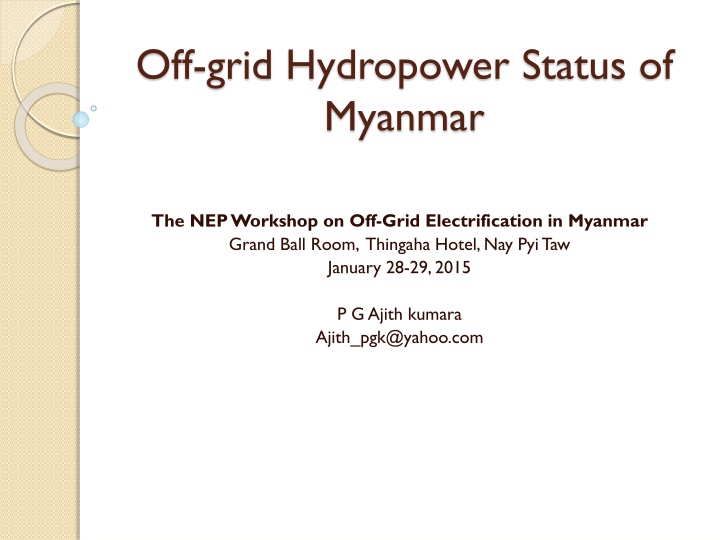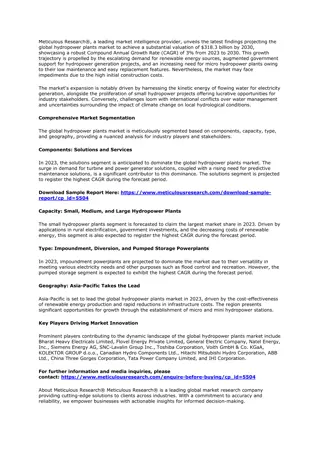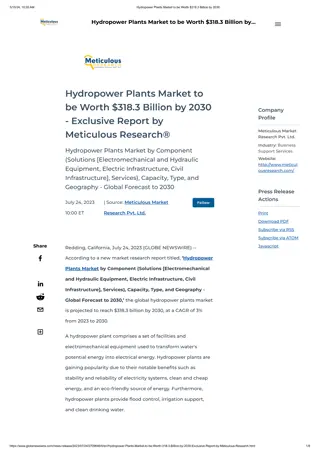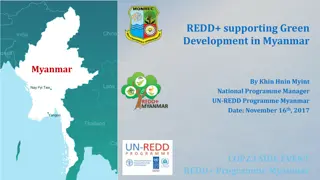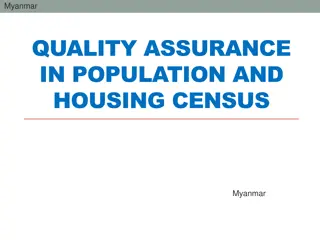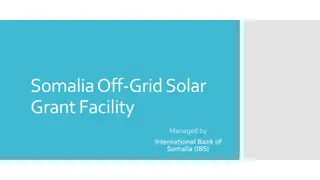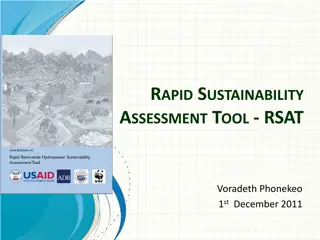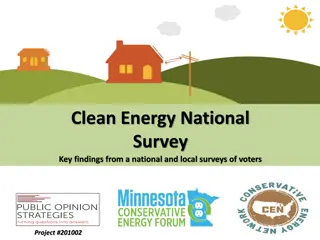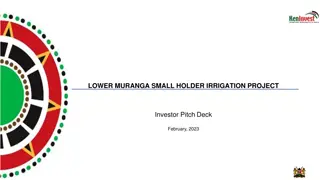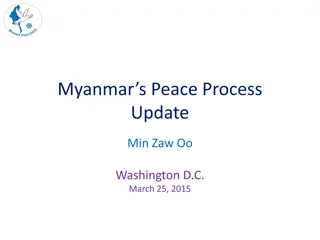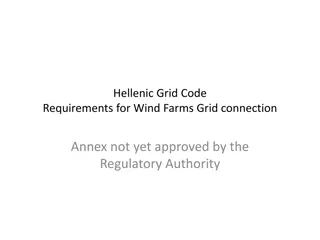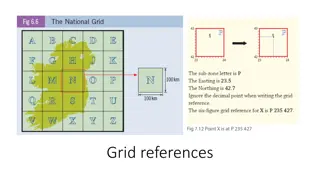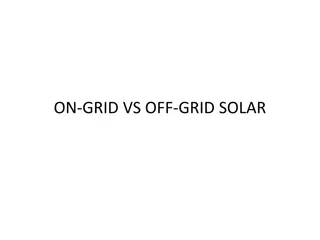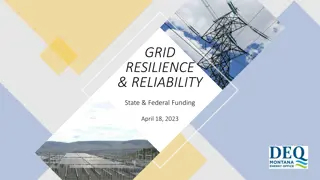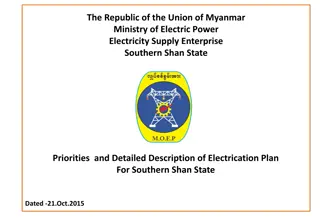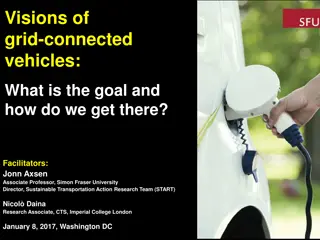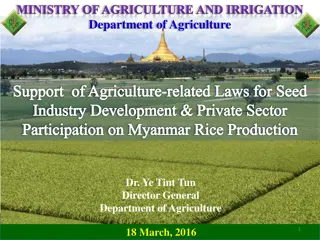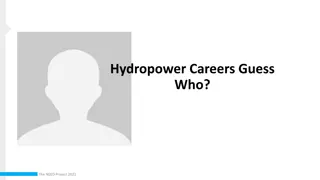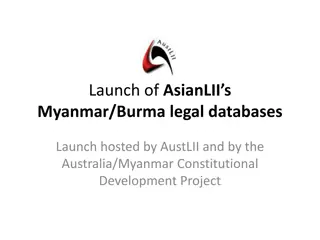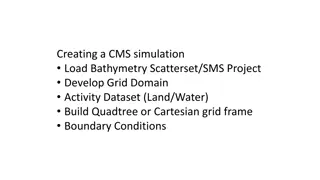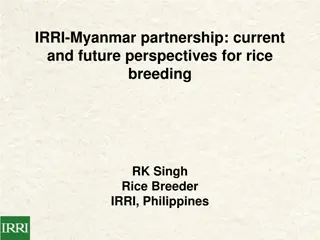Overview of Off-Grid Hydropower Status in Myanmar
The NEP workshop on Off-Grid Electrification in Myanmar held in Nay Pyi Taw in 2015 shed light on various off-grid hydropower projects in different states of Myanmar. The projects range from small-scale individual setups to larger community-based initiatives, showcasing a mix of private, government-owned, and DRD-funded projects. The hydro power projects are categorized based on capacity and ownership, with details on technical aspects, service providers, and comparison with Sri Lanka. Specific projects like Domestic HPP in Shan and Sagaing states and ESE-owned projects highlight the variety in off-grid electrification efforts in Myanmar.
Download Presentation

Please find below an Image/Link to download the presentation.
The content on the website is provided AS IS for your information and personal use only. It may not be sold, licensed, or shared on other websites without obtaining consent from the author.If you encounter any issues during the download, it is possible that the publisher has removed the file from their server.
You are allowed to download the files provided on this website for personal or commercial use, subject to the condition that they are used lawfully. All files are the property of their respective owners.
The content on the website is provided AS IS for your information and personal use only. It may not be sold, licensed, or shared on other websites without obtaining consent from the author.
E N D
Presentation Transcript
Off-grid Hydropower Status of Myanmar The NEP Workshop on Off-Grid Electrification in Myanmar Grand Ball Room, Thingaha Hotel, Nay PyiTaw January 28-29, 2015 P G Ajith kumara Ajith_pgk@yahoo.com
Outline Visited Hydro power projects Categories of hydro power projects Characteristics of Hydro power Technical status Hydro power service providers Comparison with Sri Lanka off grid Hydro power
35kW 200 HH Private own 200W 1 HH
300kW 2000> HH ESE owned Mechanical power Small industry runs Private owned
7kW 130HH DRD Funded Unknown power 80 HH DRD funded
Distribution line 300VA voltage stabilizer
Visited Hydro power projects Shan, Chin, Mandalay and Sagaing states 22 hydro projects visited Capacity range 0.1kW to 1,500kW 6 nos. of service providers interviewed Individual, community based, private ,government owned and government funded projects
Categories of hydro power projects Domestic HPP (06 nos.) 1 5 HH <500W power Village HPP (12 nos.) Upto 100kW Few hundreds HH Private, community and DRD funded Operate by Community or owner Government (DHPI, ESE) HPP (03 nos.) Upto 1,500kW National grid tariff structure O & M by ESE
Domestic HPP Available in Shan and Sagaing states Low head turbine technology Unit cost Ks. 500,000 800,000 Fix in Irrigation channels Output power 100W 400W PowerPal (http://www.powerpal.com) Canadian design (available upto 75kW)
Domestic HPP Not required any form of approval/ permission Can be acquired only well income and water sources owned families Owners may supply electricity for few neighbors at Ks. 2,000 per bulb Owners use light as well as TV and audio system No significant bad impact on environment Equipments can be purchased by cash only
Domestic HPP Monthly O & M cost Ks. 3,000 6,000 Bearing life span 1 to 3 months Very poor power Voltage varies 150V 260V Frequency varies 35Hz 65Hz Not use controller Tube bulb with magnetic ballast and Incandescent bulb only use Ready made (PMG) generator available in market Turbine and housing manufacturing by local technicians
Village HPP Invested by Private entrepreneur, community and DRD or two of these Capacity range is 3kW to 75kW Actual output is less than 50% of the designed power Locally manufactured turbines use Monthly energy cost is Ks. 300 to 3,000/= ( one project15,000) Project implementation cost upto ks250,000 per HH Energy demand 2 to 5 bulbs, TV Audio systems, mobile phone and Rice cooker Financing management not much transparent
Village HPP... Private owned Started targeting own industry 2 projects in Shan state based on grain crusher, rice mill and oil expeller One project from Sagaing state based on turbine manufacturing Owners have technical capacity for O & M Do not deal with banks
Village HPP... Community based Project starting By practicing neighbour village HPP or By encouraging hydro power developer or manufacturer Per house invest up to Ks. 250,000 All advices are taken from developer/ machine suppliers Electricity consumer society run with mutual understand Written approval not required Social, financial or technical record are not maintaining
Village HPP... DRD developed DRD fully funded and contractor selected by tender calling Capacity less than 20kW O & M by community Beneficiaries have little aware on income Very poor specification in tender documents
Village HPP general comment- policy DRD has been started 100% funded HP development last couple of years No recording/ registration methods of projects Local governments have supported for some projects in financing and technically Monthly charge based on nos. of appliances or fix rate
Village HPP general comment- Social Over 80% of beneficiaries are farmers and the balance is retails seller, labours(skilled, unskilled) Businessmen, labours(skilled, unskilled) Monthly energy consumption 4kWh- 75kWh Major electricity usages are Lighting, Audio/ video, Phone.(rice cooker) Freely electricity supply for community centres, School and monastery Project manage with mutual understand and no record minutes Project developing and purchasing through a single person or a company Very poor safety level (not use RCCBs, MCBs or fuses)
Village HPP general comment- Technical Turbine are not match for the site specification Not use a control system (fix load/ sluice gate control)very poor quality power (150V- 260V and 35Hz to 70Hz) Hidden cost to maintain appliances Voltage stabilizer has to be used with TV and audio system Project failure rate is unacceptable level and maintenance cost is very high Over all efficiency is less than 30% Machines life time is 3 10 year
Village HPP....Technical Locally made turbines Little knowledge on critical aspects on turbine (speed matching, controlling, bearing selection, finishing or turbine) Some projects abandoned due to endless failures Poor workshop facility (very old lathe and drills)
Energy pricing Energy cost vary Ks. 40 -250 per kWh Energy consumption 5kWh to 70kWh per month Major electricity demand for 2 to 5 bulbs, TV/ Audio, phone charge , Rice cooker
Government Hydro power projects DHPI has developed in 1980s and1990s ESE tariff structure apply Capacity is 200kW to 1500kW Imported machineries use 11kV transmission line with multiple nos. Of step down transformers Regularly fail bearing, generator and electronics components
Government Hydro power .... Var HPP bearing fail 5 time per year Laiva HPP diode fail few times per year Very poor attention on maintenance activities(non of flow controller functioning)
Service providers(Domestic and village HPPs) Hydro power developer Acting as an intermediary linking villagers with equipment suppliers Advice on technical, social and financial aspects Supply all equipment and earn profit Contribute for maintenance work Machine manufacturer Manufacture turbines, penstock(steel) panel board Act as a developer also
LCC analysis 15yrs LCC @10% discount rate (ks/kWh) Investment Capacity cost @ 20yrs (Ks/kW) NPV @ 10% discounted Project Actual power Amount(Ks) Year Domestic HPP 0.25 600,000 2014 600,000 220 6,000,000 Pan Oo Tang 25 60,000,000 2002 188,305,703 380 7,900,000 Mong In 1 5,000,000 2014 5,000,000 550 12,000,000 Owe Kong 15 50,000,000 2014 50,000,000 200 6,650,000 Ming In 3 500,000 2014 500,000 860 7,500,000 Laouk Lon 10 10,000,000 2011 13,310,000 376, 4,100,000 35Ks
LCC analysis... By practicing advance technology (use in developing countries) Energy cost(ks/kWh) can be reduced up to 20% -50% Capacity cost(Ks/kW) can be reduced upto 20% to 50% (based on 20years LCC) Cost variation Project cost increases 20% - 50% Life time increase over 20 years (3 times) O and M cost reduce upto 50% Energy generation increase about 50%
Comparison with Sri Lanka HP Community based concept Project implementation cost Technology Project O & M expenses
Community based concept Registering in local government as a welfare society(Electricity consumer society, ECS) Main posts of society are adviser, president, secretary, treasurer and working committee Maintain minutes of each meeting General meeting calls quarterly and emergency meeting call to get special occasions Pass the annual budget 20% to 40% project cost is in-kind labour and materials All construction doing by members with guidance of the developer
Community based.. Maintain bank account and monthly saving deposits Two of president, secretary and treasurer have to be present to withdraw money from account ECS management has to be change annually Knowledge sharing between ECS
Technology Developer Facilitate between villages and all other stakeholder Manage technical, project, social and financial areas Manufacturer Design and manufacture according to site specification Install and commissioning Maintenance Mechanical and electrical parts manufacturers Main components Water intake, Head race, Forebay tank Penstock, Turbine, Generator, Controller, Distribution panel, Distribution line
Forebay tank Short wall Trash rack Spill way Penstock Flush outs Flush outs
Project O & M expenses 10kW project, 50 HH Monthly income (LKR 300x50) =15,000($115) Operator salary Monthly saving Annual saving = 6,000($46) =9,000($70) =108,000($830)
